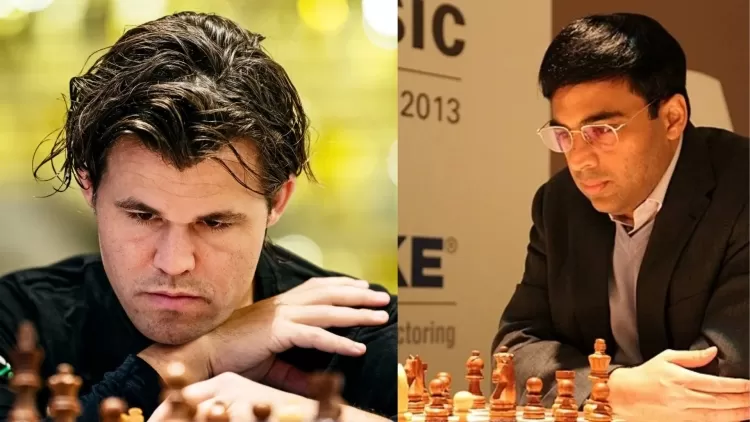The Chess Feud: Magnus Carlsen vs. FIDE and Vishwanathan Anand's Strategic Withdrawal
The world of chess, traditionally known for its intellectual battles on the board, is now embroiled in a much more heated off-the-board battle, as a conflict between Magnus Carlsen and FIDE (the international chess governing body) reaches new heights. This latest chapter in the chess world drama involves Vishwanathan Anand, India’s greatest chess player, who has pulled out of the Freestyle Chess Grand Slam Tour—a tournament co-owned by none other than Magnus Carlsen himself.

The Controversy Over the Freestyle Chess Grand Slam
The Freestyle Chess Grand Slam Tour, set to feature some of the world’s top players, including Vishwanathan Anand, Gukesh, Ramesh Babu Prananda, and Magnus Carlsen, was generating huge excitement among chess fans. Anand, who was expected to face his student Gukesh, was poised to play in what could have been a thrilling match. However, Anand’s sudden withdrawal from the event has sparked much speculation and intrigue.
While Anand did not publicly provide a reason for his exit, it seems clear that the underlying tensions between FIDE and the organizers of the Freestyle Chess Club (FCPC) played a role. The FCPC had reportedly offered $100,000 annually to FIDE as a goodwill gesture, but FIDE rejected the offer and instead demanded a sum of $500,000, which the organizers deemed unjustifiable. This standoff has undoubtedly added to the already simmering tensions between the chess community's governing body and Carlsen’s camp.
FIDE's Outrage Over the "World Champion" Title
One of the main points of contention is the Freestyle Chess Grand Slam's decision to call the winner of their event a "world champion." FIDE, understandably, took issue with this title being used, as it is the governing body that officially recognizes the world chess champion—the title is only awarded through tournaments organized under their umbrella, such as the World Chess Championship.
FIDE’s objections to the use of the “world champion” title were seen as a direct challenge to the credibility of the Freestyle Chess Grand Slam and its organizers. This sparked a war of words, with the FCPC’s Henrik Butner calling FIDE's demands "ridiculous" and stating that they were ready for a legal battle. Magnus Carlsen himself weighed in, stating that while chess will always be bigger than him, some organizations (like FIDE) may not be.
Magnus Carlsen’s Comments and FIDE's Response
Carlsen's remarks about FIDE were sharp and direct. In a public statement, he declared, "Chess will always be bigger than I am, but specific organizations maybe not." His comment that FIDE was not necessarily more significant than him reflects his growing influence in the chess world and his tension with the governing body. His position in the chess world is undeniable, but his refusal to back down from this dispute shows the friction between his personal brand and FIDE's authority.
In response, FIDE did not remain silent. The governing body, which has been criticized in the past for bending its rules to accommodate Carlsen—such as allowing him to participate in the World Rapid and Blitz Championship during the Ganguly controversy—has now taken a firm stance against the Freestyle Chess Tour and Carlsen’s involvement in it. FIDE’s CEO has been vocal in condemning the tournament’s organizers, and Vishwanathan Anand's withdrawal from the event has become a symbolic gesture of support for the governing body.
Vishwanathan Anand’s Strategic Move
Anand’s decision to withdraw from the tournament may seem understated, but it is clear that it speaks volumes. By quietly stepping away, Anand has made a strong statement without uttering a word of public confrontation. His withdrawal is likely a gesture of solidarity with FIDE, signaling that he is firmly aligned with the official governing body, despite the tensions within the chess world. This move could be seen as a strategic step to avoid getting caught up in the increasingly polarized chess politics between FIDE and Magnus Carlsen's camp.
Anand’s decision not to respond directly to Carlsen’s accusations regarding his role in FIDE adds another layer of complexity to the issue. In his comment during the Ganguly controversy, Carlsen questioned Anand’s commitment to FIDE, accusing him of being insufficiently assertive in his position as a member of the organization. By pulling out of the Freestyle Chess Grand Slam, Anand has shown that he is not backing down, nor is he willing to engage in further public disputes.
A Clash of Titans: The Chess World Divided
This clash between FIDE, Magnus Carlsen, and Vishwanathan Anand is emblematic of a broader divide within the chess world. On one hand, there is the authority of FIDE, which holds the power to organize the official world championships and maintain the integrity of competitive chess. On the other hand, there is the growing influence of individual players like Magnus Carlsen, whose personal brand and popularity have significantly reshaped the global chess landscape.
The Freestyle Chess Tour and the battle for the title of "world champion" is just one of the many issues currently dividing the chess world. Players, organizers, and governing bodies all have different visions for the future of the game, and this ongoing dispute underscores the challenges of balancing tradition with innovation in the modern era.
Conclusion: A Critical Moment for Chess
Vishwanathan Anand’s withdrawal from the Freestyle Chess Grand Slam is more than just a personal decision—it is a statement about the state of chess today. As the chess world navigates the tensions between FIDE, Magnus Carlsen, and other key figures, the sport finds itself at a crossroads. The dispute over the legitimacy of tournaments, the “world champion” title, and the influence of organizations like FIDE raises important questions about the future direction of competitive chess.
As the war of words continues, the chess community must decide whether it will come together to support the game's long-standing traditions or allow individual interests to dominate. Whatever the outcome, it is clear that the world of chess is far from settling its internal conflicts, and this feud is far from over.
What's Your Reaction?














